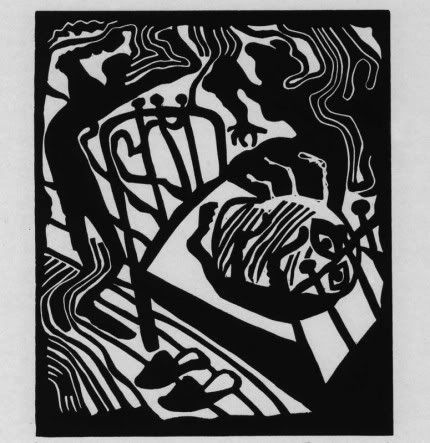I've been unusually social the past few weeks. I have two friends who live in my building, A and T, and September is kind of birthday month for some of my older friends (D, M and...Db[?]). I went to Austin to see a friend from college, and I hope to soon go to Seattle to visit a friend from I-don't-remember-where.
I'm finding that a lot of the same topics are coming up when I spend time with these different groups of people. I'm not deliberately keeping tallies. Maybe I should, because I regularly embarrass myself by continuing a conversation with T in Oakland that I actually had with D in Concord. Is everyone getting this?
It seems obvious that topics would find their way into conversations among people of the same age group, in this case late 20's and early 30's. But things like mortgage, the stock market, car payments and talk of starting families isn't something my friends and I regularly delve into, at least not willingly. We talk about the current political shortcomings of the U.S. because how can you not? But if you want to get everyone talking, bring up a traumatic high school experience.
It's deliciously ironic that talking about high school is an old faithful antidote to potentially awkward social atmospheres. It is both an ice breaker and something to fall back on when the night starts to wear on and you're almost out of liquor. I'm pretty sure that in years to come, deals between major corporations will be struck not on a golf course, but in a bar, with a good old session reminiscing about the woes and trappings of adolescence. Even the SWPL blog
touched on it.
I often try and compound these conversations with questions about books assigned in high school classes. Which ones did you like? Which ones didn't you like? It interests me to know what texts made an impact on people at that age, when each day teeters among such heavy extremes and we unwittingly parade ourselves before some unseen committee.
To me it's very telling, perhaps because books played such an important part to my own development. For other people, and for me too, books are ancillary to experience. What you read in English class and what you did during your lunch period couldn't be more different. I have to concede, but if there's anything that could tenably be an exception to this, if one author could have told all our stories, whether we cared to admit it or not, it would have to be Franz Kafka's "The Metamorphosis."
"The Metamorphosis"
probably vies with Shirley Jackson's "The Lottery"
for the dicstinction of "Weirdest High School Reading Assignment." Even people who have no interest in literature can quote you the first line of "Metamorphosis"
ten, fifteen years later. At the risk of stating the obvious, Kafka provides no preamble, nothing to elucidate Gregor's horrific, inexplicable tranformation. "Gregor Samsa awoke one morning to find that he had been transformed into a giant insect." I'm sure scholars of St. Paul or Aquinas could do a good job explainining the mystery and absurdity right out of
The Metamorphosis, and thank heavens I didn't have one in my sophomore English class.
Holden Caulfield was, is and probably always will be the fictional character most lionized by American high school English students with so much as a passing interest in literature. His depth is remarkable, and in the massive cauldron of contradictions that make up his character, none of us have to look very far to find something of ourselves in him. Who isn't tired of "phonies?"
But the delightful, tragicomedic anecdotes about high school and the baleful forces that asserted themselves in so many ways--from acne pimples to nervous nausea--don't call up Holden Caulfield in my mind. Time after time, I'm reminded of Gregor.
I haven't read
The Metamorphosis in years, but the interpretation of my first reading fifteen years ago (!) stubbornly keeps itself fixed somewhere in the peripheries whenever I revisit it, despite more mature, studied readings since. Like many teenagers, I questioned my own signficance, and what is more picayune or casually done away with than a beetle or cockroach?
Then there were the changes going on in my body. Not to sound melodramatic, but they sometimes bordered the harrowing, the grotesque. The horror that overcame Gregor upon discovering his transformation wasn't completely alien to me. I may as well have been a fucking beetle going to my locker in the morning, what with the stinkeying and nonverbal condescension that plagued me and lots of other people at one time or another.
I don't know where I'm going with this. Perhaps I feel like the scholars who put "The Metamorphosis" on the high school reading list didn't consider the multifarious implications that allowed for the deeply felt parallels I drew when I read it. Generally speaking, the story's credibility is derived from the exquisite evenness of its structure, its philisophical complexity, and the manifold erudite analyses that have procured a place for "The Metamorphosis" high up in the precincts of the western canon. I once read a paper on the political implications of Gregor's parents. Did Kafka foresee the rise of fascism?
Well, Gregor's parents were my parents. Gregor's parents were every authority figure. Gregor's parents were the order and discipline that these people bestow with so much importance. They represented the routines and distinctions in life that were as ostensibly reliable and unshakable as the walls that made up Benicia High School. But they were cold and monolithic, insensitive and deaf to all the bullshit that falls in between. Sudden, unforseeable changes are little more than hurdles that need quick doing away with. I'm not trying to debunk the merits of serious reading.
I'm just saying that Gregor kind of told my story.













